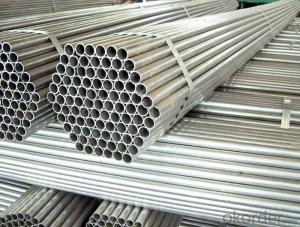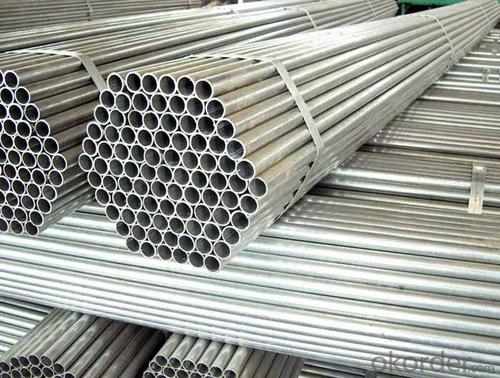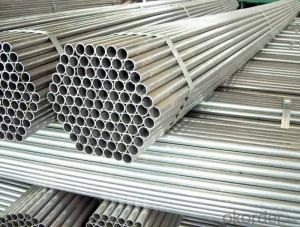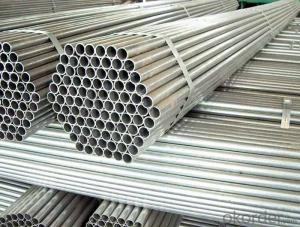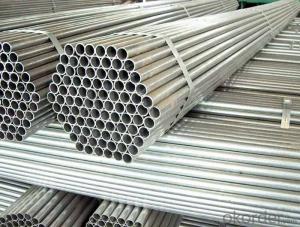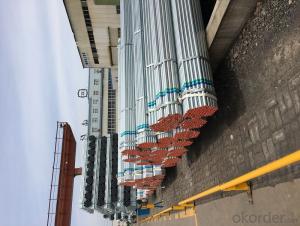BS, JIS, GB, DIN, ASTM, API GI Hot Dipped Galvanized Steel Tube
- Loading Port:
- Tianjin
- Payment Terms:
- TT or LC
- Min Order Qty:
- 20 m.t.
- Supply Capability:
- 15000 m.t./month
OKorder Service Pledge
OKorder Financial Service
You Might Also Like
We are company that have many years experience and professional manager team and engineer team and sales team, sure we will provide you high quality of pipe and professioanl service.
Seamless pipe possesses a hollow section and without seam around the strip steel. It is made with solid bar or steel ingot by perforating machine. As the facture process does not include any welding, seamless pipes are considered to be stronger and more durable. Generally speaking, seamless pipe has better pressure resistance and security than other classifications, and was usually more easily available than welded pipe.
2、Main Features of the Seamless Pipe:
• High working accuracy
• High strength
• Small inertia resistance
• Strong therming dissipine ability
• Good appearance
• Reasonble price
3、Seamless Pipe Specification:
Standard | GB, DIN, ASTM ASTM A106-2006, ASTM A53-2007 |
Grade | 10#-45#, 16Mn 10#, 20#, 45#, 16Mn |
Thickness | 8 - 33 mm |
Section Shape | Round |
Outer Diameter | 133 - 219 mm |
Place of Origin | Shandong, China (Mainland) |
Secondary Or Not | Non-secondary |
Application | Hydraulic Pipe |
Technique | Cold Drawn |
Certification | API |
Surface Treatment | factory state or painted black |
Special Pipe | API Pipe |
Alloy Or Not | Non-alloy |
Length | 5-12M |
Outer Diameter | 21.3-610mm |
Grade | 20#, 45#, Q345, API J55, API K55, API L80, API N80, API P110, A53B |
Standard | ASME, ASTM |
1) Material:20#(ASTM A 106/A53 GRB.API5LGRB,GB),45#,16Mn,10#.
2) Specification range: OD: 21.3-610mm, WT:6-70mm, length:6-12m or according to the requirement of clients.
3) Executive standards: GB, ASME API5L.ASTM A 106/A53,Despite of the above standards, we can also supply seamless steel pipe with standard of DIN, JIS, and so on, and also develop new products according to the requirements of our clients!
4) Surface: black lacquered, varnish coating or galvanized.
5) Ends: Beveled or square cut, plastic capped, painted.
6) Packing: bundles wrapped with strong steel strip, seaworthy packing.
4、Packaging & Delivery:
Packaging Details: | seaworthy package, bundles wrapped with strong steel strip |
Delivery Detail: | 15-30days after received 30%TT |
5、FAQ of Seamless Pipe:
①How is the quality of your products?
We have many years business experience in this area, and we have professional engineer and manager team and sure we can provide you high quality production and professional service.
②How about price?
Yes, we are factory and be able to give you lowest price below market one, and we have a policy that “ for saving time and absolutely honest business attitude, we quote as lowest as possible for any customer, and discount can be given according to quantity”,if you like bargain and factory price is not low enough as you think, just don’t waste your time.Please trust the quotation we would give you, it is professional one.
③Why should you chose us?
We can give you both.Additionally, we can also offer professional products inquiry, products knowledge train(for agents), smooth goods delivery, exellent customer solution proposals.Our service formula: good quality+good price+good service=customer’s trust
SGS test is available, customer inspection before shipping is welcome, third party inspection is no problem.
6、Seamless Pipe Images:
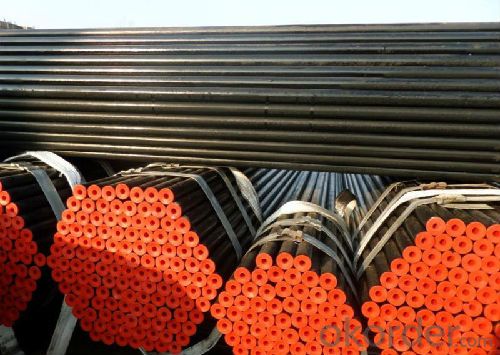
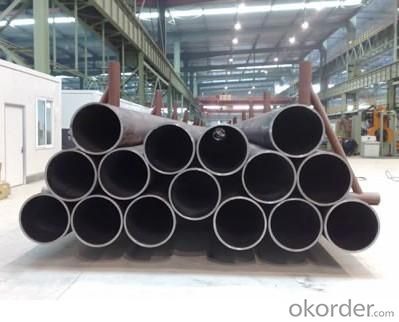
- Q: How are steel pipes classified based on their schedule?
- Steel pipes are classified based on their schedule, which refers to the wall thickness of the pipe. The schedule classification system includes different numbers such as 5, 10, 40, 80, etc., which indicate the thickness and strength of the steel pipe.
- Q: What are the factors to consider when designing a steel pipe system?
- When designing a steel pipe system, several factors need to be considered to ensure its functionality, durability, and efficiency. These factors include: 1. Pressure and temperature requirements: Determining the maximum pressure and temperature that the steel pipe system will be exposed to is crucial. This information is essential for selecting the appropriate pipe material, thickness, and jointing method to withstand the system's operating conditions. 2. Pipe material: Choosing the right material for the steel pipe system is important. Factors such as corrosion resistance, strength, and cost should be considered. Common materials for steel pipes include carbon steel, stainless steel, and alloy steel. 3. Pipe size and thickness: Calculating the adequate pipe size and wall thickness is essential to ensure the required flow rate and pressure drop within the system. The pipe size affects the system's efficiency and must be chosen based on the anticipated flow rates and pressure losses. 4. Support and anchoring: Proper support and anchoring are critical to prevent sagging, movement, and stress on the steel pipe system. The design should consider the weight of the pipes, the fluid being transported, and any external forces that may act on the system. 5. Expansion and contraction: Steel pipes expand and contract with temperature variations, causing stress on the system. Expansion joints or loops should be incorporated to allow for thermal growth and contraction, preventing damage and distortion. 6. Fluid compatibility: Understanding the properties of the fluid being transported, such as corrosiveness, viscosity, and potential for sedimentation or scaling, is important in selecting the appropriate pipe material and protective coatings or linings. 7. Accessibility and maintenance: Consideration should be given to the accessibility of the system for installation, inspection, and maintenance purposes. Proper access points, valves, and fittings should be included in the design to allow for easy maintenance and repairs. 8. Environmental factors: The steel pipe system may be exposed to various environmental conditions, such as extreme temperatures, humidity, or corrosive substances. These factors should be considered when selecting the pipe material, protective coatings, and insulation. 9. Regulatory compliance: Compliance with applicable industry standards, codes, and regulations is essential. The design should adhere to safety guidelines and applicable building codes to ensure the pipe system's integrity and longevity. 10. Cost consideration: Finally, the overall cost of the steel pipe system, including material, installation, maintenance, and energy consumption, should be taken into account. Balancing cost-effectiveness with performance requirements is crucial in achieving an efficient and economical design. By considering these factors, engineers and designers can create a steel pipe system that is suitable for its intended purpose, ensuring its longevity, reliability, and safety.
- Q: How are steel pipes measured and specified?
- Steel pipes are measured and specified using several key parameters. The most common ones include the outer diameter (OD), wall thickness, and length of the pipe. The outer diameter refers to the measurement of the pipe's outside surface from one end to the other. It is typically expressed in millimeters (mm) or inches (in), and it plays a critical role in determining the pipe's strength and carrying capacity. Different applications require different OD sizes, which can range from a few millimeters to several feet. The wall thickness of a steel pipe refers to the distance between its outer and inner surfaces. It is measured in millimeters or inches and is crucial for determining the pipe's durability and resistance to pressure. Thicker walls can handle higher pressure, making them suitable for applications that require transporting liquids or gases under high pressure. The length of steel pipes is generally specified in meters or feet. Standard pipe lengths are often 6 or 12 meters (20 or 40 feet), but custom lengths can be requested based on project requirements. It is important to note that longer pipes may require additional support to prevent sagging or structural issues. Apart from these primary measurements, steel pipes may also be specified based on other factors such as material grade, manufacturing standard, and surface finish. Material grade refers to the quality and composition of the steel used in the pipe, which determines its strength and corrosion resistance. Manufacturing standards, such as ASTM or API, ensure that the pipes meet specific quality and performance criteria. Surface finish specifications may include factors like galvanized coating, which provides protection against corrosion or other specific requirements based on the intended application. Overall, the measurement and specification of steel pipes involve considering the outer diameter, wall thickness, length, material grade, manufacturing standard, and surface finish. These parameters are crucial in determining the suitability of the pipe for various applications and ensuring its performance and durability in different environments.
- Q: Is the same specification seamless steel pipe more expensive than welded pipe?
- You need to see this in the interval that diameter, such as seamless pipe and welded steel tube 530*20 mm compared to 5450 yuan per ton, seamless pipe, welded steel pipe, which is 4550 yuan, small diameter 10*2 mm, seamless pipe will require far 10000 per ton, just need more than 6000
- Q: Can steel pipes withstand high temperatures?
- Yes, steel pipes can withstand high temperatures. Steel is known for its excellent thermal conductivity and high melting point, making it suitable for various applications that involve exposure to elevated temperatures.
- Q: What are the advantages of using steel pipes in the manufacturing industry?
- There are several advantages of using steel pipes in the manufacturing industry. Firstly, steel pipes are known for their high strength and durability, making them ideal for carrying heavy loads and withstanding harsh conditions. Secondly, steel pipes have excellent resistance to corrosion, reducing the risk of leaks and ensuring a longer lifespan. Additionally, steel pipes offer a wide range of sizes and shapes, allowing for flexibility in design and easy customization. Furthermore, steel pipes are cost-effective compared to other materials, as they require minimal maintenance and have a low risk of failure. Lastly, steel pipes are environmentally friendly, as they are fully recyclable and contribute to reducing carbon emissions during manufacturing. Overall, the advantages of using steel pipes in the manufacturing industry make them a reliable and efficient choice for various applications.
- Q: Are steel pipes suitable for desalination plants?
- Yes, steel pipes are suitable for desalination plants. Steel is a durable and corrosion-resistant material that can withstand the harsh conditions and high-pressure requirements of desalination processes. Additionally, steel pipes provide excellent flow characteristics and can be easily welded, making them a reliable choice for transporting and distributing saltwater in desalination plants.
- Q: What is the difference between steel pipes and aluminum pipes?
- The main difference between steel pipes and aluminum pipes lies in their composition and properties. Steel pipes are made of an alloy of iron and carbon, which provides them with excellent strength and durability. They are often used in applications that require high-pressure or extreme temperatures. On the other hand, aluminum pipes are composed of aluminum, a lightweight metal that offers good corrosion resistance. Aluminum pipes are commonly used in industries where weight is a concern, such as aerospace and automotive. Overall, the choice between steel and aluminum pipes depends on the specific requirements of the application.
- Q: How are steel pipes manufactured?
- Steel pipes are manufactured through a process called pipe manufacturing or pipe making, which involves various steps such as forming, welding, and finishing. The process starts with the procurement of raw materials, which are typically steel coils or sheets. These coils are then fed through a series of rollers to shape them into a cylindrical form. The edges of the coils are then welded together to create a continuous pipe. After welding, the pipes undergo various finishing processes such as sizing, straightening, and cutting to achieve the desired dimensions and specifications. Finally, the pipes are tested for quality assurance and may undergo additional treatments like galvanization or coating before being ready for use in different industries and applications.
- Q: What is the typical lifespan of steel pipes?
- The typical lifespan of steel pipes can vary depending on various factors such as the quality of the steel used, the environmental conditions, and the maintenance and usage of the pipes. However, on average, steel pipes are known to have a lifespan of around 50 to 100 years. With proper installation, regular inspections, and appropriate maintenance, steel pipes can often exceed this lifespan and provide reliable service for several decades. It is important to note that factors such as corrosion, erosion, and external damage can impact the lifespan of steel pipes, so it is crucial to implement preventive measures and necessary repairs to ensure their longevity.
Send your message to us
BS, JIS, GB, DIN, ASTM, API GI Hot Dipped Galvanized Steel Tube
- Loading Port:
- Tianjin
- Payment Terms:
- TT or LC
- Min Order Qty:
- 20 m.t.
- Supply Capability:
- 15000 m.t./month
OKorder Service Pledge
OKorder Financial Service
Similar products
Hot products
Hot Searches
Related keywords
